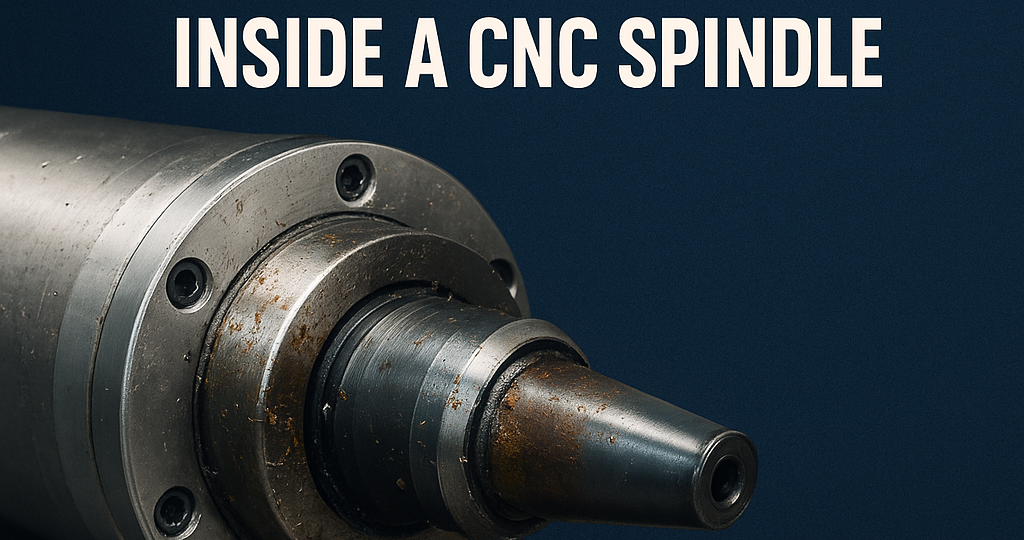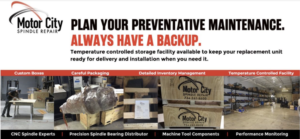
🧼 How to Know if There Are Signs of Contamination Inside a CNC Spindle
In the world of CNC machining, your spindle is everything. It’s the heart of the operation — driving precision, speed, and productivity. But like any precision mechanism, it’s vulnerable to something sneaky and damaging: contamination. Whether it’s coolant, chips, dust, or even moisture, contaminants inside your spindle can spell disaster for bearings, drawbars, and ultimately your entire machine.
So how do you know if your spindle is contaminated before things get expensive? Let’s break it down.
🚨 1. Abnormal Noise and Vibration
One of the earliest signs of trouble is an unusual increase in noise or vibration coming from the spindle. While worn bearings can make noise on their own, contamination accelerates bearing wear dramatically. If you notice a grinding, clicking, or rumbling sound, especially during high-speed operation, contamination might already be inside the spindle.
Pro tip: Use a vibration analyzer or portable sensor to detect changes over time. Compare against baseline readings after a clean rebuild.
💦 2. Visible Coolant Leaks or Oil Residue
If you see coolant or lubrication oil leaking around the spindle nose, taper, or housing, that’s a big red flag. Coolant intrusion often happens from:
-
Damaged or worn-out labyrinth seals
-
Improper air purge systems
-
High-pressure coolant forcing its way past barriers
Even small amounts of coolant can sneak into the spindle housing and damage the bearings or rust internal components.
🧲 3. Rust or Corrosion on the Taper
Take a close look at the tool holder taper or inside the spindle nose. If you notice rust-colored stains, pitting, or corrosion, that usually means moisture or coolant has made its way inside. This is especially true for machines that sit idle for long periods or operate in humid environments.
🛠️ 4. Drawbar Retention Force Drops
A contaminated drawbar system might not grip tools correctly. Contaminants like fine chips or coolant can:
-
Gum up the Belleville washers or disc springs
-
Cause misalignment in the gripper fingers
-
Lead to inconsistent or low retention force
Test your drawbar force regularly using a pull force gauge. If the force drops below the machine spec, and no other cause is evident, contamination might be the culprit.
🧪 5. Bearing Failure… Too Soon?
Bearings should last thousands of hours under normal conditions. If yours are failing prematurely, and you’ve ruled out over-speeding, improper preload, or crashes, then contamination is a prime suspect. Often, the bearings will show:
-
Discoloration (from heat or chemical attack)
-
Grease breakdown or washout
-
Pitting or scoring on races
A teardown inspection will usually reveal the full extent of the damage.
🔍 6. Unexplained Thermal Growth or Axis Drift
If you’re noticing that your machine is drifting slightly or thermally growing more than expected, it may be due to contamination increasing internal friction or affecting spindle balance. The friction can cause heat buildup, leading to expansion and slight positional inaccuracy.
🧼 Preventing Contamination: A Quick Checklist
-
✅ Ensure your air purge system is functional and active during spindle operation
-
✅ Inspect and replace spindle seals during regular maintenance
-
✅ Avoid overusing high-pressure coolant without proper deflection systems
-
✅ Use clean, filtered air and coolant
-
✅ Store your tools and holders in clean, dry environments
🔧 Final Thoughts
Contamination inside a CNC spindle doesn’t just ruin bearings — it compromises your machine’s accuracy, tool life, and productivity. Early detection is key. With regular inspection, testing, and a little vigilance, you can catch contamination before it becomes catastrophic.
Got questions about diagnosing spindle issues or curious about preventive maintenance plans? Drop them in the comments or shoot us a message — we’re always happy to help you keep your machines running clean and tight.
CONTACT US ANYTIME IF YOU’D LIKE TO CHAT WITH OUR EXPERTS OR STOP BY OUR 25,000 SF MANUFACTURING FACILITY LOCATED IN DEARBORN, MICHIGAN!(734) 261-8600 OR EMAIL US AT SALES@MOTORCITYREPAIR.COM

*All quotes are accompanied by a detailed failure analysis report
*We frequently repair spindles in 2-5 business days in emergency situations
*Normal time averages 1-3 weeks for standard repairs
*We keep precision bearings, seals, o-rings, encoders, and other commonly replaced spindle parts in stock and on hand
*Always available 24 hours a day and 7 days a week for emergency repair service
*We deliver the repaired product to you
*Our repairs are balanced, test ran, and certified with a full 1 Year Warranty
*We repair or build new depending on your needs
*Guaranteed cost savings
Need a FREE ESTIMATE? Click HERE
To view our most recent blog post, click HERE
Have questions about ballscrews? Check out our BALL SCREW WEBSITE

